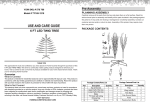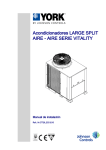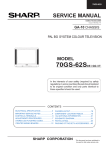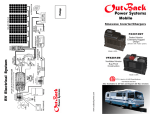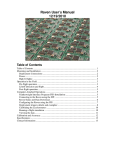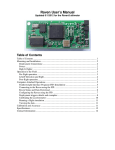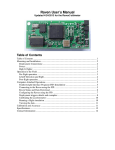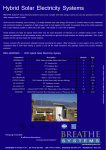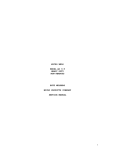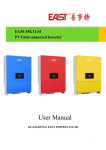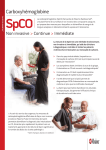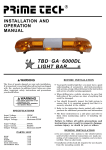Download GP1 & GP2 Manual - Micro Products Company
Transcript
MICRO WELD MODEL GP1, GP2 CERAMIC FUSION BUTT WELDERS MICRO PRODUCTS COMPANY SERVICE MANUAL 1 TABLE OF CONTENTS 1.0 2.0 3.0 4.0 5.0 6.0 7.0 8.0 9.0 10.0 11.0 12.0 13.0 1.0 SPECIFICATIONS GENERAL OPERATING INSTRUCTIONS BASIC OPERATING PARTS BASIC OPERATING PARTS LOCATION TYPICAL OPERATING SEQUENCE SPECIAL ADJUSTMENTS PREVENTIVE MAINTENACE SUGGESTED SETTINGS DIAGNOISTIC CHART FOR TROULBE-SHOOTING ELECTRICAL SCHEMATIC SAFETY RERMINDERS BUYERS GUIDE PARTS LIST SPECIFICATIONS Type of Welding Process Welding Range Material Suitability Standard Operating Voltages Maximum Line Demand 230 Volt Maximum Line Demand 115 Volt Single Phase AC Transformer Clamp Method Mounting MODEL GP1 Ceramic Fusion 20ga to 8ga AWG-Copper Strand or Bunched Conductor 115/230 Volts 5amps@100% duty cycle 15amps@10% duty cycle 9amps@100% duty cycle 29amps@10% duty cycle 1.5 KVA Maximum Compound Hand Lever 4-Caster Wheels or Bench MODEL GP-2 Ceramic Fusion 12ga to 4ga AWG-Copper Strand or Bunched Conductor 115/230 Volts 9amps@100% duty cycle 28amps@10% duty cycle 18amps@100% duty cycle 56amps@10% duty cycle 3.0 KVA Maximum Compound Hand Lever 4-Caster Wheels or Bench Dimensions and Weights Height Overall Floor or Bench space Welding Die Height Weight 20”-Bench, 51”-Truck 9” x 15” Bench Type 24” x 24” Truck Type 11” – Bench Type 42” – Truck Type 170 LBS – Bench Type 215 LBS – Truck Type 20”-Bench, 53 ½” – Truck 9” x 15” Bench Type 30” x 28 ½” Truck Type 11” – Bench Type 44 ½” – Truck Type 170 LBS – Bench Type 215 LBS – Truck Type FEATURES OF MICRO-WELD CERAMIC FUSION WELDING EQUIPMENT • • • • • • • • • Micro Weld quality and workmanship Heavy-duty construction & components East to operate controls Low maintenance costs Easy to set welding parameters Safety electrical switch circuits Heavy-duty weld heat selection switch No-upset burr formation during weld process, all strands locked into weld coalescence Sensitive straight slide movable headpiece assembly equipped with ball bearings 2 2.0 GENERAL OPERATING INSTRUCIONS 2.1 ELECTRICAL HOOK-UP INSTRUCTIONS First determine that available electrical service in your plant corresponds to the nameplate rating located on welder housing. Electrical wiring to welder must be of sufficient size to deliver full ampere load with no appreciable loss during weld cycle. The welder will not operate properly if there is more than a 10% variation in the line voltage. In general, the welder should be fused with a slow blow fuse of the 100% duty cycle rating. The minimum power cable size to the welder can be obtained by using this same current rating. Refer to National Electrical Code and local electrical regulations for adequate power sizes; disconnect methods and fusing guidelines. Remember line voltages to the welding machine are potentially dangerous should the power cords be damaged or severed. The welding voltages at the welding dies will not harm an operator since they do not exceed 10 volts. 2.2 SAFETY PRECAUTIONS (See section 11.0) 2.2.1 ELECTRICAL Maintain electrical cable to welder in good repair. Welder must be grounded and connections securely tightened. Heat Switch must not be changed to new position while a weld cycle is in process. Disconnect electrical service before serving welder – high voltages are located within the base of the welder. 2.2.2 MECHANICAL Operator while using welder must wear safety glasses. Keep all safety guards on welders and use properly. Operators must be instructed on basic operation of unit to prevent injury. Check nameplate rating and keep within material size range for each welder. 2.3 WELDING DIES The dies and shoes supplied with the welder will handle most size and material types within the range of the welder. For new weld applications consult the factory for special die and shoe sets. 3 3.0 BASIC OPERATING PARTS 3.1 WELD HEAT SELECTION SWITCH Weld heat is selected by means of a tap switch with 6 steps of voltage. Number one indicates the highest setting and number 6 the lowest. The switch is located on the top left corner of the machine. 3.2 HEAD CLOSED SPACE SETTING This adjustment is made by turning lower socket set screw located below the slide shafts on right end of movable headpiece. 3.3 HEAD OPEN SPACE SETTING This adjustment is made by turning upper socket set screw located below the slide shafts on right end of the movable headpiece. 3.4 LIMIT SWITCH SETTING The weld limit switch controls the cut-off point of current flow to the welding dies. Turning the socket set screw located on the rear slide shaft on the movable headpiece makes this adjustment. 3.5 OPERATING LEVER This lever is actually a cam that sets the open (starting) space then, after the stock is clamped, is turned to activate the weld switch. 3.6 UPSET PRESSURE Upset pressure is required for each weld and is obtained by an internal coil spring. A knurled knob is located on the front slide shaft on the movable headpiece. 3.7 CLAMPING SYSTEM This is a dual system consisting of left and right clamping devices. The welding dies and shoes, the replaceable portion of the clamping mechanism, hold the wire to be joined during the weld cycle. A forward motion of the clamping mechanism facilitates the clamping operation. 4 4.0 BASIC OPERATING PARTS LOCATION 5 5.0 TYPICAL OPERATING SEQUENCE 5.1 All insulating materials must be removed from conductors where they contact lower welding dies. Set weld head selection switch to recommended chart settings. Set upset pressure to recommended chart settings. Rotate spacing cam to proper chart settings. Twist end of conductor in direction of natural lay, pulling outward. Carefully square cut conductor end so no individual wires extend beyond cut. Note: Use sharp scissors, because end preparations are important. Select correct ceramic sleeve or tool for wire to be welded. Thread conductor into ceramic sleeve so that the wire ends are midway through sleeve. Rotating ceramic sleeve in direction of lay will assist threading procedures. Clamp preset conductor and sleeve into welding die set, so that the ceramic sleeve is centered between open welding dies. Thread other prepared conductor into sleeve and allow the conductor to gently but firmly contact first conductor. Positive contact to wire ends is important for a good weld. Clamp that conductor into welding die. Rotate and center ceramic sleeve to assure free movement of conductors during the weld process. Rotate spacing lever until it contacts and depresses the operation switch, hold for 1 to 3 seconds to assure a complete weld cycle. Unclamp welded conductors and remove ceramic sleeve. Fracture expendable type and disassemble reusable type. The inside diameter of ceramic sleeve slightly exceeds the nominal conductor size; therefore the weld zone is lightly larger than conductor diameter. An additional sizing operation, swaging, may be required should weld zone exceed tolerances on subsequent processing operations. Micro Products has a special swage tool with exchangeable tooling available to assist with this sizing operation. 5.2 5.3 5.4 5.5 5.6 5.7 5.8 5.9 5.10 5.11 5.12 5.13 5.14 5.15 6 6.0 SPECIAL ADJUSTMENTS 7 8 7.0 PREVENTIVE MAINTENANCE TECHNIQUE Keep in Mind that these welders are precision built to last many years, but will require good maintenance procedures. They are designed to be as automatic as possible with a minimum dependence on the ability of the operator. Adjustments must be made by those thoroughly familiar with the operating principles of the welders. 7.1 WELDING DIE NOTES 7.1.1 Welding dies and die shoes in poor condition are the primary caused of bad welds. 7.1.2 Check die sets for excessive wear and replace if necessary. 7.1.3 Clean weld die bottoms to remove oxides with emery cloth placed on a flat surface. 7.1.4 Clean die seats with emery cloth to brighten contact areas. 7.1.5 After cleaning of dies be sure to wipe off with soft clean cloth. 7.1.6 Completely tighten dies into seats to assure a good contact. 7.1.7 Worn die shoes will not hold stock during a weld cycle, change steel faces or replace complete shoes. 7.2 WEEKLY 7.2.1 Tighten all loose parts. 7.3 QUARTERLY 7.3.1 Repeat above service items. 7.3.2 Check grease requirements on clamp arms pivot shafts and lubrication points. 7.3.3 Check anneal parts and replace all worn or broken assemblies 7.3.4 Check contacts on magnetic contactor for worn contacts. 7.3.5 Clean heat switch contacts with low residue cleaner and recoat with petroleum jelly. 7.4 ANNUALLY 7.4.1 Repeat previously noted items. 7.4.2 Check for wear in clap arm pivots. 7.4.3 Clean inside and outside of welder. 7.4.4 Check grease requirements on headpiece slide shafts, grease lightly. 7.4.5 Caution: make sure that power supply is disconnected before servicing welder in anyway! 9 7.5 WELDING DIES AND DIE SHOES INFORMATION Description: Welding dies – Lower conducting electrode and clamp jaw. Welding die shoes – Upper clamping member. Welding dies and die shoes in poor condition are the main causes of bad welds. Care of die sets: 7.5.1 Use a brass or fiber blade to remove particles of flashings that build-up on die sets. Excessive flash build-up causes die burns on material and shorting of die sets. 7.5.2 Do no attempt to clamp material that is not suited for welder into die sets. Undersize materials will slip and burn die grooves, oversize materials will overstress clamping parts. 7.5.3 Do not use welding die sets for a vise. not withstand the mechanical abuse. These parts will 7.5.4 Whenever welding dies are replaced, clean bottoms of dies and corresponding die seats to a bright and clean condition before bolting them tightly into place. An oxidized surface will insulate the welding dies and reduce effective welding voltage. 7.5.5 Welding die shoes must swivel freely within the clamp arm pivots to prevent cracking of die shoes. File down die shoe boss if necessary. 7.5.6 Welding die set will wear with use and must be changed occasionally for good welding results. Keep and adequate supply of replacement parts available. Wire and rod slippage is a problem caused by poor die sets and a major cause of wire breaks. 10 8.0 SUGGESTED SETTINGS RECOMMENDED SETTINGS FOR MODEL GP-1 AND GP-2 MICRO WELD WELDERS STOCK SIZE HEADPIECE OPEN WELD HEAT UPSET PRESSURE MODEL GP-1 20GA 3 3 1 18Ga 3 ½ 3 1 16Ga 4 2 2 14Ga 4 ½ 2 3 ½ 12Ga 5 ½ 1 3 ½ 10Ga 6 1 3 ½ 9Ga 6 1 4 8GA 6 1 4-4 ½ MODEL GP-2 12Ga 3 5 2 10Ga 3 ½ 4 2 ½ 9Ga 3 ½ 4 3 8Ga 4 4 3 6Ga 5 3 4 ½ 4Ga 6 1-2 4 ½ NOTE: These settings are approximate and may be varied to obtain the best weld. 8.1 WELDED STRAND OR BUNCHED COPPER AND ALUMINUM WIRE INDUCTORS Theory: Welds are formed within a ceramic tube or block and no filler materials are needed. Wire ends are resistance heated to a plastic condition and hot forged together within a ceramic tool, which acts as a crucible. The resultant coalescence (weld) locks all single filaments into a solid weld zone…Since strand conductors have configuration voids on the faying surfaces, the plastic material normally forced to the outside on a normal weld, is forced into the voids eliminating the upset burr common with standard upset weld. (This type of weld is not suitable for solid wire.) 11 8.2 CERAMIC FUSION TECHNIQUE 9.0 DIAGNOSTIC CHART FOR TROUBLE-SHOOTING 9.0.1 SERVICE HINTS FOR STRAND CONDUCTOR WELDERS 12 Conductors must be able to slide freely within ceramic tools during weld cycle, therefore rotate and move ceramic tool side to side prior to welding. Be sure to center ceramic tool between die sets. Porosity and voids in weld zone may be corrected by using one or more of the following suggestions. 1. Increase upset pressure. 2. Decrease weld heat 3. Readjust timing point of weld heat cut-off, limit switch adjustment, to allow heat to cut-off slightly sooner. 4. Check to make sure conductor is not binding in ceramic tool. 13 Amount and length of weld nugget (solid portion of weld) can be varied by one or more of the following suggestions. 1. Increase starting space between die sets when weld nugget is small. 2. Decrease space between die sets when weld nugget is too large. 3. Adjusting limit switch to hold on or cut-off current at a different position. Fracturing of ceramic tools and bent conductors can be corrected by one or more of the following methods. 1. Decrease weld heat to prevent excessive softening of conductors on either side of sleeve. 2. Decrease starting space so as to decrease length of upset and amount of conductor exposed to heat. 3. Decrease upset pressure and still maintain a fused area. 4. A few of the very small stranded and bunched conductors just do not have enough mechanical strength to be processed by this process. 14 9.1 ELECTRICAL TROUBLE-SHOOTING OF WELDER (Caution!! Extreme care should be exercised when making these tests. Dangerous voltages are present in the welder. Only persons familiar with electrical safety precautions should perform these tests.) 9.1.1 TROUBLE-SHOOTING TABLE (See section 9.1.3) This electrical trouble-shooting table is furnished as a suggested method of trouble-shooting the welder. The individual steps of the table should be performed in the order given, to make the tests valid. The electrical schematic (section 10) furnished for these tests show the table test points. The table may be used for welders with a different but closely related wiring by using corresponding test points. During all tests, line voltage should be connected to L1 & L2 of the welder. The heat switch should be set to the #1 position. 9.1.2 FINAL ELECTRICAL CHECKS Set the heat switch to the number 1 position, connect the voltmeter across the welding dies. Press the operating switch. The meter reading will typically be less than 10 VAC. Consult the weld specification sheet for this value. Rotate the heat switch through all settings. If the voltage is not read at any setting, the heat switch may be defective. Actuate the weld limit switch; observe the reading goes to zero. Release the weld limit and operating switches, the reading should remain at zero. 15 9.1.3 TEST LEAD CONNECTION METER READING PROBLEM IF NO READING PRESS OPERATING SWITCH WELD LIMIT SWITCH ACTUATED PRESS ANNEAL SWITCH 115 VOLT ONLY.USE SCHEMATIC B-5474A.REFERENCE TO 9.1.1. L2 L2 L2 L2 L2 L2 L2 L2 L2 FU1-1 FU1-2 PB1-1 PB1-2 LS1-1 LS1-2 CR1-1 CR1-2 S1-1 115 115 115 115 115 115 115 115 115 VAC VAC VAC VAC VAC VAC VAC VAC VAC Bad fuse connection Open fuse Open wire to operating switch Bad operating switch Open wire to weld limit switch Open weld limit switch Open wiring to contactor Bad contactor Open wire to heat switch X X X X X 230 VOLT ONLY.USE SCHEMATIC B-5553A.REFERENCE TO SECTION 9.1.1 X1 X2 X2 X2 X2 X2 X2 L2 L2 L2 X2 FU1-1 FU1-2 PB1-1 PB1-2 LS1-1 LS1-2 CR1-1 CR1-2 S1-1 115 VAC 115 VAC 115 VAC 115 VAC 115 VAC 115 VAC 115 VAC Line Voltage Line Voltage Line Voltage Bad control transformer Bad fuse connection Open fuse Open wire to operating switch Bad operating switch Open wire to weld limit switch Open weld limit switch Open wiring to contactor Bad contactor Open wire to heat switch X X X X X NOTE: To perform repair consult section 13 for parts identification. 16 17 11.0 SAFETY REMINDERS The following accident prevention information is presented to eliminate potential hazards while operating, inspecting or repairing Micro-Weld electric resistance welding equipment. Important safety compliance information for Micro-Weld Welders. GENERAL 1. Qualified personnel, prior to using equipment, must instruct an operator on basic operation and malfunction methods. 2. Safety eyeglasses must be worn by all personnel operating or servicing welders. 3. Use safety equipment properly and keep safety equipment on welders. 4. Determine that both operating voltages and hertz (cycles) of power supply correspond to ratings listed on welder nameplate located on welder housing. 5. Check nameplate ratings and keep within capacities and material categories stated therein. 6. Adjustments or repairs must be made by persons thoroughly familiar with operating principles of welder. 7. Welder must be disconnected from power supply prior to maintenance or repair procedures. ELECTRICAL 1. Refer to National Electrical Code and local regulations for adequate electrical wiring to power welder. Do not operate welder with inadequate electrical power supply cords or cable. 2. All welders must be grounded through power supply and welder ground connection terminal securely tightened. 3. All welders must be able to be disconnected from power source either by a double breaking disconnect switch or unplugged by standard rated plugs. 4. All welders must be fused to prevent injury should an electrical malfunction occur. Welders must never be fused for an ampere load that exceeds the ratings stated on welder nameplate. Normally welders are fused using the nameplate rated load; time lag parameters functional to standard fuses allow this specification. 5. Electric power cords to welder must be kept in good condition. Report any damage or potential hazards to maintenance personnel. 6. The weld heat selection switch, potentiometer or range selection devices must not be changed to a new position while a weld operation is in process. 18 12.0 BUYERS GUIDE HOW TO ORDER PARTS: You must provide 1. Machine Model 2. Machine Serial Number 3. Voltage Then identify part(s) on part list (last page in book) and provide MICRO with the circled number. CALL MICRO at 800-872-1068 OR FAX MICRO at 630-787-9360 Provide MICRO with your company name and purchase order number. 19 “G” SERIES BUTT WELDERS PARTS LIST GP1,GP2,GS,GT,GC MODEL/ PART NO. DESCRIPTION G-01A G-01B G-04 G-05 G-06 G-17 G-18 G-19 G-30 G-31 G-32 G-33 G-34 G-40 GP-40 G-41 G-42 G-66 G-140 G-141 G-143 G-08L G-08R G-09 G-10 G-11 G-12 G-13 GT-58V GS-58V GC-58V GP-58R1 GP-58R2 GP-58R3 GP-58R4 G-59 GP-59 ITEM # Headpiece assembly, stationary and movable Castings, matched machined, with bushings And shields, state for which model req’d Headpiece assembly, complete with all Operating parts less welding dies and Die shoes, state for which model required Bushing, ball bearing,(2) required Stroke limit screw and nut, nylon Shield, shaft,(2) required Limit switch adjusting screw with nylon inserts Open headpiece adjusting screw with nylon insert Felt wipes, slide shafts Spacing cam Bushing, spacing cam Stud, space cam mounting Screw and nut, tension adjusting, nylon Nut and washer, space cam attaching Tension spring, models GT,GS and GC Tension spring, models GP1 and GP2 Worm, tension adjusting Knob, tension adjusting Bolt, headpiece to top plate mounting, 4 req’d Guide, wire lift Screw, wire lift mounting 2 req’d Flashguard with mounting screws Clamp assembly, complete, left Clamp assembly, complete, right Spring, clamp tension Bolt, nut and washer, clamp mounting, front Bolt, nut and washer, clamp mounting, rear Dowel pin, clamp mounting Grip, handle insulating Welding dies, .020” to .150” capacity Welding dies, .050” to .128” capacity Welding dies, .035” to .225” capacity Welding dies, radius grooves, 20ga to 14ga Welding dies, radius grooves, 12ga to 8ga Welding dies, radius grooves, custom fitted Welding dies, radius grooves, 6ga to 4ga Screw, welding die attaching, for models: GT, GS and GC Screw, welding dies attaching, for models: GP-1 and GP-2 35598 35530 48401 93157 35515 35601 35572 35512 35513 35521 35516 92750 80027 80027 35568 35564 90231 35585 90601 35523 35542 35555 80026 90628 90635 92553 48326 35560 35560 35561 35559 35558 35579 35586 90603 90603 21 “G” SERIES BUTT WELDERS PARTS LIST GP1,GP2,GS,GT,GC MODEL/ PART NO. DESCRIPTION G-60T GP-60F G-61 G-50 G-51 G-51A G-52 G-53 G-54 G-55 G-56L G-56R G-57L G-57R G-15 G-16 G-20 G-25 G-26 G-27 G-28 G-80 G-81 G-82 G-82A G-83 G-85 G-90 G-91 G-93 G-138 G-145 G-146 G-69 G-70GP1 G-70GP2 G-70GS ITEM # Welding die shoes, pair, tapered For models: GT, GS and GC Welding die shoes, pair, tapered For models: GP-1 and GP-2 Screw, welding die shoe attaching Slot type anneal jaw, right Slot type anneal jaw, left Screws, quick type anneal mounting 4 req’d Screws, quick action type mounting 4 req’d Movable anneal jaw with handle and grip Spring, anneal jaw tension Screw, anneal jaw tension adjusting Stationary anneal jaw, left Stationary anneal jaw, right Quick action anneal assembly, complete left Quick action anneal assembly, complete right Limit switch Screw and nut, limit switch mounting Operating switch Bracket, limit switch mounting Screw, limit switch bracket mounting Cover, limit switch Screw, cover mounting, 2 required Tap switch, weld heat selection, 25 amp type Knob, tap switch, 25 amp type Number plate, sequence: No 1 thru No 10 Number plate, sequence: No 1 thru No 6 Screw, tap switch mounting Contactor Power cord, per foot price Cord grip Control circuit transformer, 110/120 coil Lamp assembly, complete Fuse holder Fuse Bushing, transformer secondary insulating Transformer weld, 120 volts with 6 taps Model GP1 Transformer weld, 240 volts with 6 taps Model GP2 Transformer weld, 240 volts with 10 taps Model GS 35525 35524 90704 62032 62031 90802 90601 62171 80029 90206 62091 62091 62094 62094 35562 90816 57810 35510 91033 35511 91035 57802 48215 55510 55508 90826 57614 86006 86155 57601 58164 58117 58100 37710 55519 55518 55535 22 “G” SERIES BUTT WELDERS PARTS LIST GP1,GP2,GS,GT,GC MODEL/ PART NO. DESCRIPTION G-70GC G-70GT G-73 G-74 G-75 G-76 G-62 GP-62 GP-63 GP-64 G-68 G-150 G-151 G-135 G-136 G-136 ITEM # Transformer weld, 240 volts with 10 taps Model GC Transformer weld, 120 volts with 10 taps Model GT Ring, transformer mounting Long screw and nut, transformer mounting 4 req’d Screw with washer, transformer strap mounting Movable head Screw with washer, transformer strap mounting Stationary head Housing assembly, for models: GS, GC and GT Housing assembly, for models: GP-1 and GP-2 Tray, debris, for models GP-1 and GP-2 Anvil, for models GP-1 and GP-2 Top plate Caster, swivel Caster, rigid Wrenches, “T” type, welder adjusting Wrench, allen type, welder adjusting, 1/8 Wrench, allen type, welder adjusting, 3/32 55517 55516 55505 55511 90602 90602 45506 45506 45504 45524 35586 48100 48101 48202 48200 48201 23 90628 90704 90635 35540 90603 35555 90628 DIES AS LISTED 35535 35524 90635 35564 35538 90704 35568 93157 35542 80027 92553 90816 35516 80026 35562 35572 35510 35524 DIES AS LISTED 35585 90601 48401 92553 35515 80026 48401 35523 57810 91033 35598 35572 35521 35514 REUSABLE CERAMIC SLEEVE AND CLAMP SCALE FULL 92119 35513 35512 D-5460A MODEL GP HEAD PARTS DISPOSABLE CERAMIC SLEEVE SCALE NONE

























